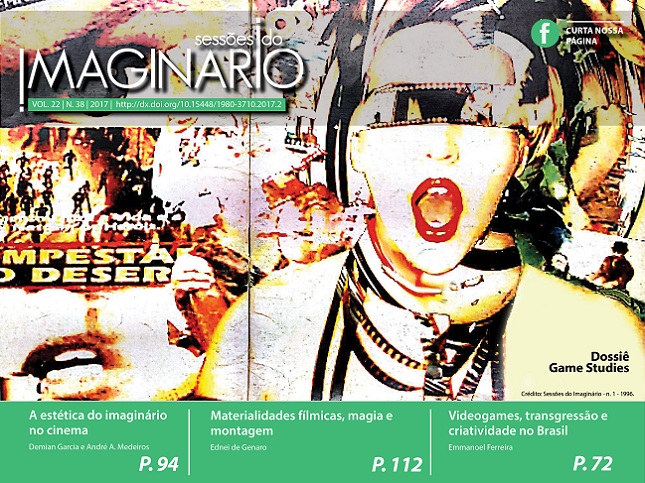Uma experiência de limiar: sobre a medialidade dos jogos (de computador)
DOI:
https://doi.org/10.15448/1980-3710.2017.2.32140Palavras-chave:
teorias dos jogos, teorias da comunicação, teorias dos media, filosofia dos mediaResumo
O presente texto realiza um breve estudo conceitual sobre o jogo e o lúdico. A partir da exposição das estruturais mediais e ontológicas do jogo, este trabalho argumenta sobre a sua particularidade como uma experiência de limiar. Por fim, por meio de uma caracterização das especificidades dos jogos de computador, levanta-se a discussão sobre um conflito conceitual entre jogo e comunicação.
Referências
BATESON, Gregory. “A Theory of Game and Fantasy.” In: BATESON, Gregory. Steps to an Ecology of Mind, p. 183–99. Northvale-NJ/London: Jason Aronson, 1972.
BEIL, Benjamin. Game Studies: Eine Einführung. Berlin: Lit, 2013.
CAILLOIS, Roger. Man, Play, and Games. Trad. Meyer Barash. Chicago: University of Illinois Press, 2011.
DISTELMAYER, Jan; HANKE, Christine; MERSCH, Dieter Mersch (Org.). Game over!? Perspektiven Des Computerspiels. Bielefeld: transcript, 2008.
FUCHS, Mathias; FIZEK, Sonia; RUFFINO, Paolo; SCHRAPE, Niklas (Org.). Rethinking Gamification. Lüneburg: Meson Press by Hybrid, 2014.
GADAMER, Hans-Georg. Wahrheit und Methode: Grundzuge Der Philosophischen Hermeneutik. Tübingen: Mohr Siebeck, 1975.
GOODMAN, Nelson. Languages of Art: An Approach to a Theory of Symbols. Indianapolis/New York/Kansas City: Hackett Publishing, 1968.
GÜNZEL, Stephan. “The Mediality of Computer Games”. In: FROMME, Johannes; UNGER, Alexander (Org.), Computer Games and New Media Cultures, p. 31–46. Dordrecht: Springer Netherlands, 2012.
HOAD, T. F. “Illusion”. The Concise Oxford Dictionary of English Etymology. Oxford University Press, 1996.
HUIZINGA, Johan. Homo Ludens: A Study of the Play-Element in Culture. London: Routledge & Kegan Paul, 1980.
JUUL, Jesper. The Art of Failure: An Essay on the Pain of Playing Video Games. Cambridge: The MIT Press, 2013.
KAPP, Karl M. The Gamification of Learning and Instruction: Game-Based Methods and Strategies for Training and Education. Hoboken: John Wiley & Sons, 2012.
LIEBE, Michael. “There Is No Magic Circle: On the Difference between Computer Games and Traditional Games”. In: GÜNZEL, Stephan; LIEBE, Michael; MERSCH, Dieter (Org.). Philosophy of Computer Games, p. 324–41. Potsdam: Potsdam University Press, 2008.
MAHRENHOLZ, Simone. “Analogisches Denken. Aspekte Nicht-Diskursiver Rationalität.” In: MERSCH, Dieter (Org.). Die Medien der Künste: Beiträge zur Theorie des Darstellens, p. 75–92. Munique/Paderborn: Wilhelm Fink, 2003.
MERSCH, Dieter. “Logik und Medialität des Computerspiels. Eine Medientheoretische Analyse”. In: DISTELMAYER, Jan; HANKE, Christine; MERSCH, Dieter Mersch (Org.). Game over!? Perspektiven Des Computerspiels, p. 9–41. Bielefeld: transcript, 2008.
———. Ordo Ab Chao - Order from Noise. Berlin/Zürich: Diaphanes, 2014
NEITZEL, Britta. “Metacommunicative Circles.” In: GÜNZEL, Stephan; LIEBE, Michael; MERSCH, Dieter (Org.). Philosophy of Computer Games, p. 278–95. Potsdam: Potsdam University Press, 2008.
PIAS, Claus. Computer Spiel Welten. Munique: sequenzia, 2002.
RAUTZENBERG, Markus. “Gerahmte Ungewissheit. Medialiät dnd Kontingenz im digitalen Zeitalter”. WULF, Wulf; ZABOTKINA, Vera (Org). Paragrana 24 (2), 57–73. Berlin: De Gruyter, 2015.
VON NEUMANN, John; MORGENSTERN, Oskar. Theory of Games and Economic Behavior. Princeton: Princeton University Press, 1944.
WOLF, Mark. The Medium of the Video Game. Austin: University of Texas Press, 2010.
Downloads
Publicado
Edição
Seção
Licença
Copyright (c) 2018 Sessões do Imaginário

Este trabalho está licenciado sob uma licença Creative Commons Attribution-NonCommercial 4.0 International License.
DIREITOS AUTORAIS
A submissão de originais para a Imaginario implica na transferência, pelos autores, dos direitos de publicação. Os direitos autorais para os artigos publicados nesta revista são do autor, com direitos da revista sobre a primeira publicação. Os autores somente poderão utilizar os mesmos resultados em outras publicações indicando claramente a Imaginario como o meio da publicação original.
LICENÇA CREATIVE COMMONS
Em virtude de ser uma revista de acesso aberto, permite-se o uso gratuito dos artigos em aplicações científicas e educacionais, desde que citada a fonte. De acordo com a Licença Creative Commons CC-BY 4.0, adotada pela Imaginario o usuário deve respeitar os requisitos abaixo.
Você tem o direito de:
Compartilhar — copiar e redistribuir o material em qualquer suporte ou formato.
Adaptar — remixar, transformar e criar a partir do material para qualquer fim, mesmo que comercialmente.
Porém, somente de acordo com os termos seguintes:
Atribuição — Você deve dar o crédito apropriado, prover um link para a licença e indicar se mudanças foram feitas. Você deve fazê-lo em qualquer circunstância razoável, mas de maneira alguma que sugira que a Imaginario apoia você ou o seu uso.
Sem restrições adicionais — Você não pode aplicar termos jurídicos ou medidas de caráter tecnológico que restrinjam legalmente outros de fazerem algo que a licença permita.
Avisos:
Você não tem de cumprir com os termos da licença relativamente a elementos do material que estejam no domínio público ou cuja utilização seja permitida por uma exceção ou limitação que seja aplicável.
Não são dadas quaisquer garantias. A licença pode não lhe dar todas as autorizações necessárias para o uso pretendido. Por exemplo, outros direitos, tais como direitos de imagem, de privacidade ou direitos morais, podem limitar o uso do material.
Para mais detalhes sobre a licença Creative Commons, siga o link no rodapé desta página eletrônica.

